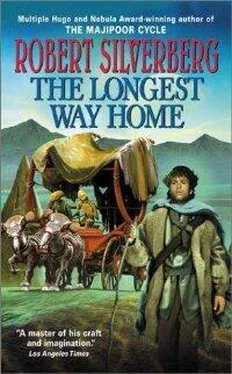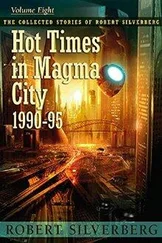Not that he attempted at all to indicate any of this to Thayle. This journey had changed him in many ways, and the uncertainties he once had had about girls now struck him as a quaint vestige of his childhood; but still, it seemed very wrong to him to be taking advantage of the hospitality of his hosts by trying to seduce the daughter of the household. His times alone with Thayle were infrequent, anyway. Like her father and brother and sometimes her mother, she went off for hours each day to work in the family fields. It was high summer, now, and the crops were growing quickly. And gradually Joseph learned that Thayle was involved with one of the young men of the town, a certain Grovin, who was almost certainly her lover and possibly her betrothed. That was something else to consider.
Joseph saw him now and then in the town, a lean, sly-faced sort, perhaps eighteen or nineteen, quick-eyed, mean-looking. He was not at all surprised, though he found it a little embarrassing, to find himself taking a dislike to Grovin. But he had no direct encounters with him.
The town itself was a modest little place, no more than two or three thousand people in all, Joseph guessed, although spread out over a fairly extensive area. All the houses were in one place, all the public buildings in another, and the farmland was beyond—the entire town holdings divided into small family-held plots, nothing communally operated as among the Indigenes, though Joseph gathered that all the townsfolk worked together at harvest-time, moving in teams from plot to plot.
This must have been the way the Folk lived before we came here, Joseph thought. A simple life, a quiet life, raise your crops and look after your cattle and have your children and grow old and give way to the next generation. That was the way the Folk of the Great Houses lived as well, he supposed, but everything they did was done in the service of their Masters, and although a wise Master treated his Folk well, the fact remained that they spent their lives working for their Masters and only indirectly for themselves.
Stendlings . A whole planet of stendlings is what we have turned them into, sparing only these few cuyling towns here and there in the outback. Joseph still could not see that there was anything seriously wrong with that. But obviously Governor Stappin and the citizens of Eysar Haven might have something different to say on that subject.
There was a statue in the middle of the little group of public buildings that formed the center of the town: a man of middle years, a very Folkish-looking man, thick-thighed and heavy-chested with his hair coming down over his forehead in bangs, carved from gray granite atop a black stone pedestal. He had not been very deftly portrayed, but there seemed to be wisdom and benevolence and much warmth in his expression as he stood there eternally looking out over the heart of the town.
Joseph could find no inscription on the base of the statue to indicate the identity of the man whom it represented. He did not dare ask any of the people strolling nearby. But certainly this must be Eysar, Joseph thought, since this town is named for him. Everyone would know what Eysar looked like: it is not necessary to put a label on his statue. He wondered if he would ever find out who Eysar was.
These were warm, lazy days. Joseph felt almost strong enough to set out for home once more, but the concept of “home” had become such a vague, remote thing in his mind that he saw no urgency in resuming his trek. Who could tell what new hardships awaited him once he took his leave of Eysar Haven? He knew what it was like, now, to starve. Here he was fed well, he had a soft place to sleep, he felt a certain warmth toward Saban and her family. It struck him as quite a plausible choice to remain here a while longer, working with Thayle and Velk and Simthot in the family fields, helping with the harvest, living as though he were really and truly the Folkish boy Waerna of Ludbrek House, now adopted into citizenship at the cuyling town of Eysar Haven.
The Master within him knew that this was foolishness, that it was his duty to get out of here as soon as he was capable of it and take himself onward toward Helikis, toward Keilloran House, toward the father and brothers and sisters who probably had never ceased mourning the loss of him and whose lives would be brightened beyond all measure by his return. It was only the weariness in him speaking, the damage that his time of eating roots and ants had caused, that made him think of lingering here. It was a sign that he was not yet healed.
But he let the days slide easily by and did not force himself to wrestle with the problem of becoming Joseph Master Keilloran again. And then, one warm humid summer evening at dusk, when he was walking through the fields with Thayle, amidst the ripening heads of grain, the whole thing was abruptly thrust upon him once more, out of nowhere, striking like a sudden lightning-bolt, an earthquake, a cataclysmic volcanic eruption.
He had just said, “Look how full these heads are, Thayle, how dark. It will be harvest-time in another month or so, won’t it? I’ll be able to help you with it by then.”
To which she replied sweetly, “Will you be staying here that long, then, Waerna? Are you not beginning to think of returning to your own people?”
He gave her a puzzled look. “My people? I have no people anymore. The Folk of Ludbrek House have scattered in every direction, those that are still alive. I don’t know where anyone is.”
“I’m not talking about the Folk of Ludbrek House. I mean your real people.”
The quiet statement rocked him. He felt like a small boat suddenly adrift in a stormy sea.
“What?” said Joseph, as casually as he could. He could not make himself look at her. “I’m not sure that I understand what—”
“I know what you are,” Thayle said.
“What I am?”
“What you are, yes.” She caught him by the sleeve and pulled him around to face her. She was smiling. Her eyes were shining strangely. “You’re a Master, aren’t you, Waerna?”
The word struck him with explosive force. He felt his heart starting to race and his breath came short. But Joseph struggled to permit nothing more than a look of mild bemusement to appear on his face. “This is crazy, Thayle. How could you possibly think that I’m—”
She was still smiling. She had no doubt at all of the truth of what she was telling him. “You have a Master look about you. I’ve seen some Masters now and then. I know what they look like. You’re tall and thin: do you see anybody tall and thin in Eysar Haven? And darker than we are. You have the darkest hair I’ve ever seen. And the shape of your nose—your lips—”
Her tone of voice was a gentle one, almost teasing. As though this were some sort of game. Perhaps for her it was. But not for him.
“So I have some Master blood in me.” Joseph kept his voice level, which was not an easy thing to manage. “Stappin said something about it to me, weeks ago. He noticed it right away. Well, it’s probably true. Such things have been known to happen.”
“ Some Master blood, Waerna? Some? ”
“Some, yes.”
“You know how to read. I know that you do. There are books in that pack you were carrying when you came here, and one night when I was outside the house very late I looked in your window and you were awake and reading one. It’s a Master book. What else could it be? And you were reading it. You look like a Master, and you read like a Master, and you have a little case that’s full of Master tools. I’ve looked at them while I was cleaning your room. I’ve never seen anything like them. And your books. I held the book-thing right in my hand and pressed the button, and Master words came out on the screen.”
Читать дальше












